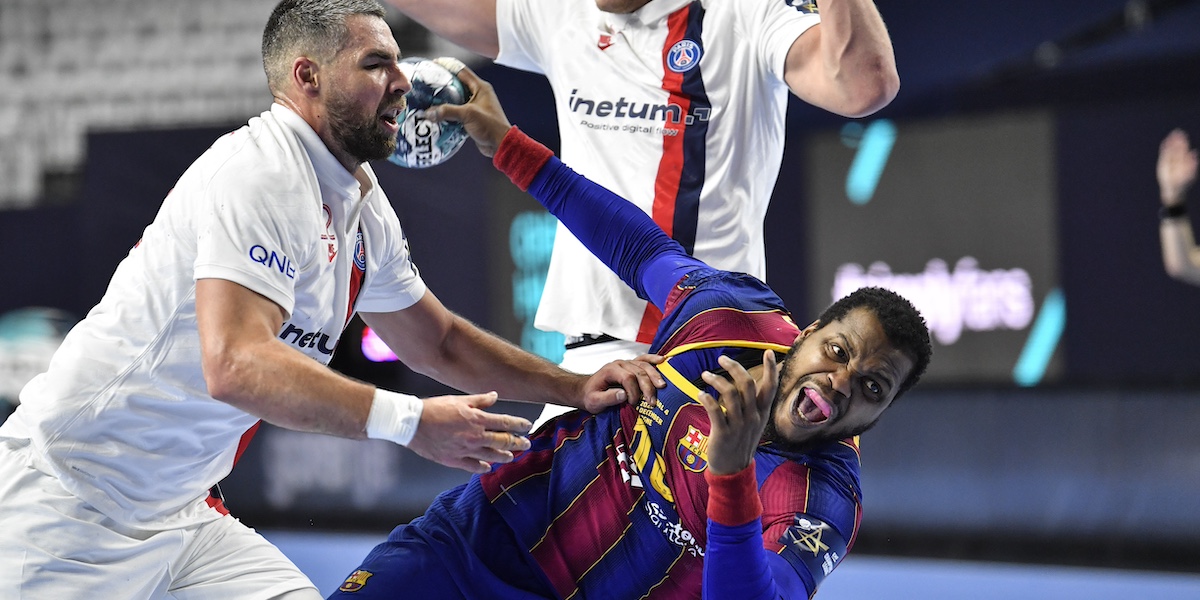Many sports organizations that in Italy and Europe are generally known in the form of football teams, and which have their main activities in football, are in reality sports clubs present in different disciplines. More than one might therefore be surprised to see Paris Saint-Germain and Barcelona playing against each other in the Champions League, but in handball, a tournament in which Barcelona holds the record for victories: eleven from 1991 to today.
Melvyn Richardson del Barcelona Handbol (Frederic Scheidemann/Getty Images)
The handball team of Paris Saint-Germain is the best known after the football team within the sports center of the same name, which however also includes an important judo school recently relaunched and attended among others by Teddy Riner, French judoka three times Olympic champion and eleven times world champion.
Teddy Riner con il kimono del PSG (Maxppp/Clementz Michel)
The Barcelona sports center is one of the best known. In addition to handball and excluding football, which does not need much introduction, its basketball team has long been one of the strongest and most relevant in Europe, as is that of Real Madrid, which like its football side is the most successful in Europe with eleven titles, the last of which was won in last season’s Euroleague.
Basketball is generally the sport in which the most famous “twins” of football teams are found, such as Bayern Munich in Germany, Olympiakos and Panathinaikos in Greece, Red Star and Partizan Belgrade in Serbia, Zenit St. Petersburg and CSKA Moscow in Russia.
Luka Doncic of the Dallas Mavericks against Real Madrid, his last European team (Borja B. Hojas/Getty Images)
The tradition of sports clubs is particularly rooted in Eastern European countries, where it spread starting from the early twentieth century as a propagation of the Soviet and Yugoslav state apparatus. Evidence of this remains in the names with which we still call certain teams which in countries under Soviet influence were controlled by state teams: CSKA were in fact called the teams of the armed forces, Lokomotiv those of the railways and Dinamo those of the police forces, moreover the most widespread, from the Caucasus to the old cities of East Germany.
Red Star against Bayern Munich in this year’s Euroleague (AP Photo/Darko Vojinovic)
In the countries of the former Yugoslavia, the largest sports clubs are still state-owned. The largest and most branched is that of Red Star, which in addition to football has over thirty teams in as many sports disciplines, from rugby to chess. The other large Serbian sports center is also located in Belgrade and is Partizan, founded after the war by the Yugoslav army and named in honor of the partisan groups that fought against Nazi-fascism.
In Italy sports clubs are mostly local and do not consistently reach high levels with homogeneous results. Among the twenty teams in Serie A football, however, there is one sports club and it is the one to which Lazio is a member, the oldest and largest in Italy. The Lazio Sports Society was founded in 1900 and since then it has expanded to include 45 competitive sections and 17 externally associated activities. Among its members over the last century, the sports club also had Fausto Coppi and Carlo Pedersoli, who before becoming Bud Spencer was the Italian swimming and water polo champion.
The rugby team of the Lazio sports club (Andrea D’Errico/LaPresse)
Sometimes the one that the Benetton family formed in their city, Treviso, is also considered a sports club, with teams that between the 1990s and 2000s won national titles in basketball, volleyball and rugby, both men’s and women’s. But more than a sports club, it was the union under the same project – called “Verde Sport” – of three separate professional clubs, of which now only one remains, in rugby.
A similar reality is that of Red Bull, which in recent years we have known for its football teams in New York, Brazil, Leipzig and Salzburg. The latter is the Austrian city where Red Bull is based and where, in addition to football, the group also has an ice hockey team. It also has another in Germany, in Munich, which like the one in Salzburg is among the strongest in its championship.
The players of the Eishockeyclub Red Bull Salzburg (AP Photo)
Real sports clubs are not only widespread in Europe, but also in South America. In these days, for example, Boca Juniors, one of the two big football teams in Buenos Aires, will elect its new president after some delay, being a non-profit sports club that cannot have a single majority owner: its ownership is shared among 315,879 members, approximately 100 thousand of whom have the right to choose the president every four years through elections. One of the strengths of the current presidency, which is running with former footballer Juan Roman Riquelme, are precisely the results obtained by all the club’s teams, including the basketball and volleyball teams, which play Favorthe sports hall a stone’s throw from the most famous Bombonera.
The Boca Juniors volleyball team at the Bombonerita (Boca Basquet)
– Read also: The things you don’t notice in sports badges
